Islam and Democracy: Examining Compatibility and Conflicts
VerifiedAdded on 2021/09/24
|6
|1409
|115
Essay
AI Summary
This essay delves into the intricate relationship between Islam and democracy, examining the compatibility of their core principles. It begins by defining key terms such as Ijtihad, communal mind, decay thesis, Muslim Brotherhood, and Pan-Arabism, providing context for the subsequent analysis. The essay argues that the ideology of Islam, with its emphasis on a divine hierarchy and religious law, presents challenges to the principles of democracy, including freedom of speech and the separation of religion and state. It references scholarly works to support the claim that strong religious identities and the influence of religious groups can impede democratic processes. The essay also explores the impact of violence and extremist interpretations within Islam on democratic societies, concluding that there are significant tensions between Islam and democracy, though the essay does not explicitly say that they are entirely incompatible. Overall, the essay offers a critical perspective on the subject, highlighting the complexities and conflicts inherent in the interaction between these two forces.
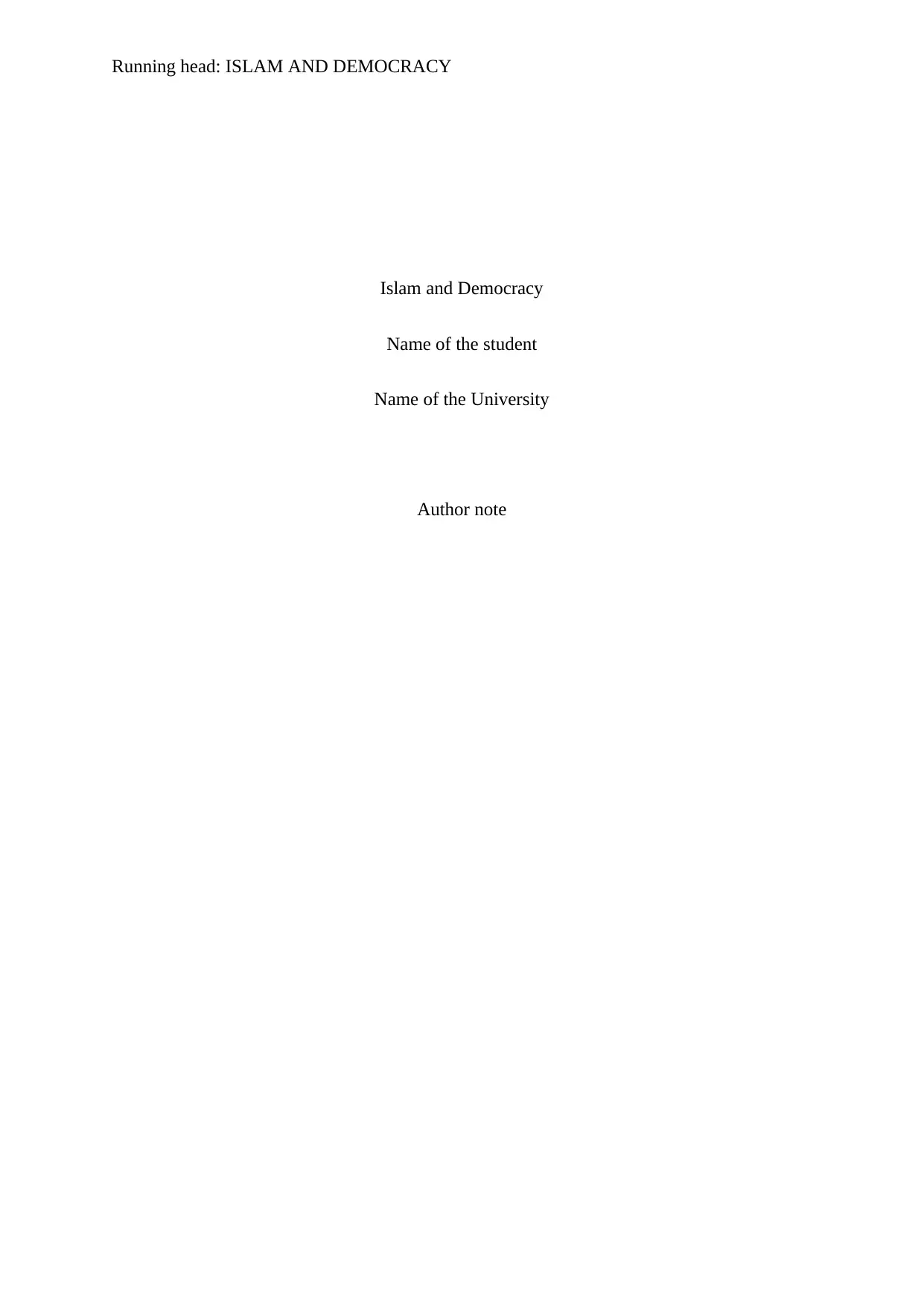
Running head: ISLAM AND DEMOCRACY
Islam and Democracy
Name of the student
Name of the University
Author note
Islam and Democracy
Name of the student
Name of the University
Author note
Paraphrase This Document
Need a fresh take? Get an instant paraphrase of this document with our AI Paraphraser
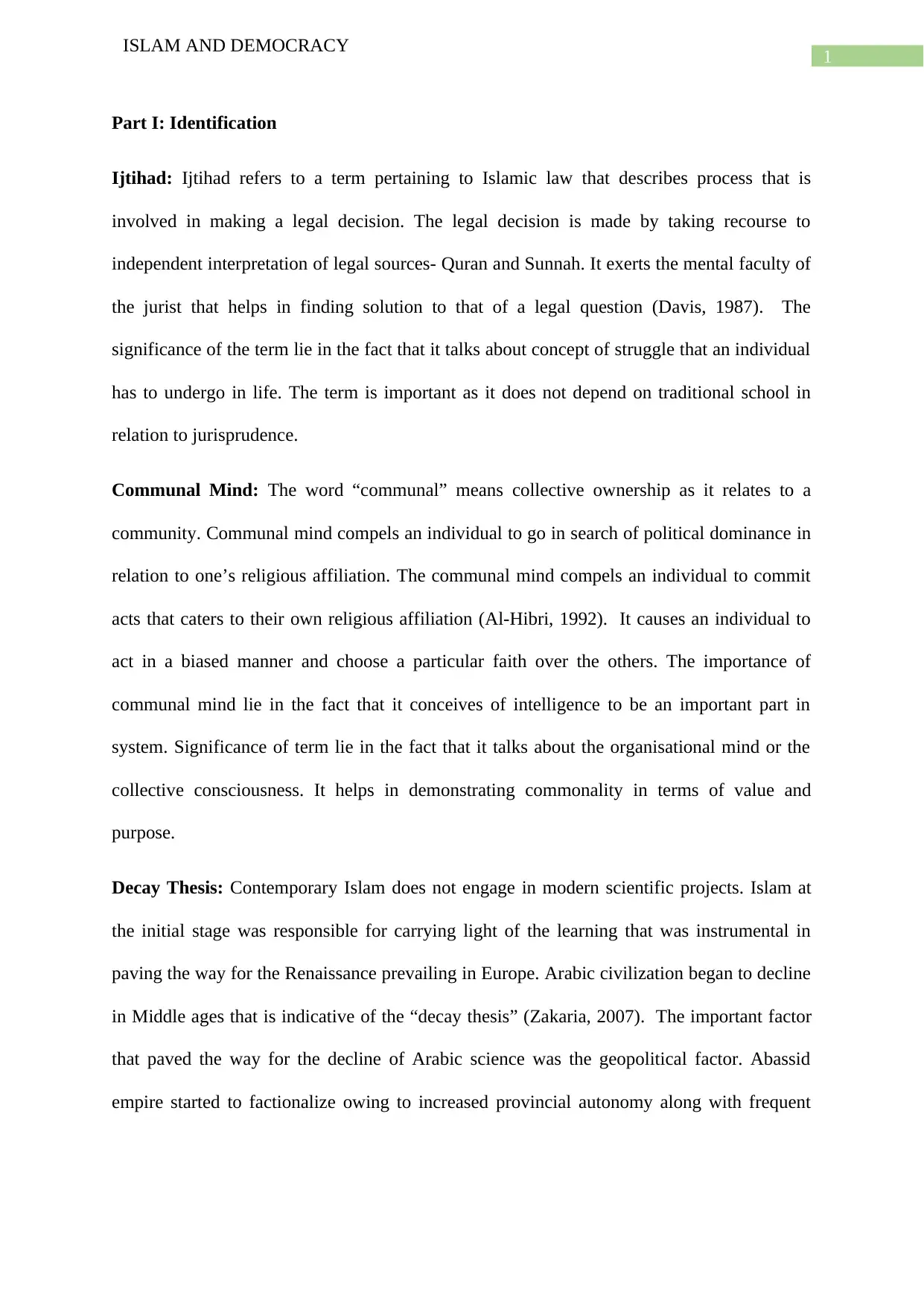
1
ISLAM AND DEMOCRACY
Part I: Identification
Ijtihad: Ijtihad refers to a term pertaining to Islamic law that describes process that is
involved in making a legal decision. The legal decision is made by taking recourse to
independent interpretation of legal sources- Quran and Sunnah. It exerts the mental faculty of
the jurist that helps in finding solution to that of a legal question (Davis, 1987). The
significance of the term lie in the fact that it talks about concept of struggle that an individual
has to undergo in life. The term is important as it does not depend on traditional school in
relation to jurisprudence.
Communal Mind: The word “communal” means collective ownership as it relates to a
community. Communal mind compels an individual to go in search of political dominance in
relation to one’s religious affiliation. The communal mind compels an individual to commit
acts that caters to their own religious affiliation (Al-Hibri, 1992). It causes an individual to
act in a biased manner and choose a particular faith over the others. The importance of
communal mind lie in the fact that it conceives of intelligence to be an important part in
system. Significance of term lie in the fact that it talks about the organisational mind or the
collective consciousness. It helps in demonstrating commonality in terms of value and
purpose.
Decay Thesis: Contemporary Islam does not engage in modern scientific projects. Islam at
the initial stage was responsible for carrying light of the learning that was instrumental in
paving the way for the Renaissance prevailing in Europe. Arabic civilization began to decline
in Middle ages that is indicative of the “decay thesis” (Zakaria, 2007). The important factor
that paved the way for the decline of Arabic science was the geopolitical factor. Abassid
empire started to factionalize owing to increased provincial autonomy along with frequent
ISLAM AND DEMOCRACY
Part I: Identification
Ijtihad: Ijtihad refers to a term pertaining to Islamic law that describes process that is
involved in making a legal decision. The legal decision is made by taking recourse to
independent interpretation of legal sources- Quran and Sunnah. It exerts the mental faculty of
the jurist that helps in finding solution to that of a legal question (Davis, 1987). The
significance of the term lie in the fact that it talks about concept of struggle that an individual
has to undergo in life. The term is important as it does not depend on traditional school in
relation to jurisprudence.
Communal Mind: The word “communal” means collective ownership as it relates to a
community. Communal mind compels an individual to go in search of political dominance in
relation to one’s religious affiliation. The communal mind compels an individual to commit
acts that caters to their own religious affiliation (Al-Hibri, 1992). It causes an individual to
act in a biased manner and choose a particular faith over the others. The importance of
communal mind lie in the fact that it conceives of intelligence to be an important part in
system. Significance of term lie in the fact that it talks about the organisational mind or the
collective consciousness. It helps in demonstrating commonality in terms of value and
purpose.
Decay Thesis: Contemporary Islam does not engage in modern scientific projects. Islam at
the initial stage was responsible for carrying light of the learning that was instrumental in
paving the way for the Renaissance prevailing in Europe. Arabic civilization began to decline
in Middle ages that is indicative of the “decay thesis” (Zakaria, 2007). The important factor
that paved the way for the decline of Arabic science was the geopolitical factor. Abassid
empire started to factionalize owing to increased provincial autonomy along with frequent
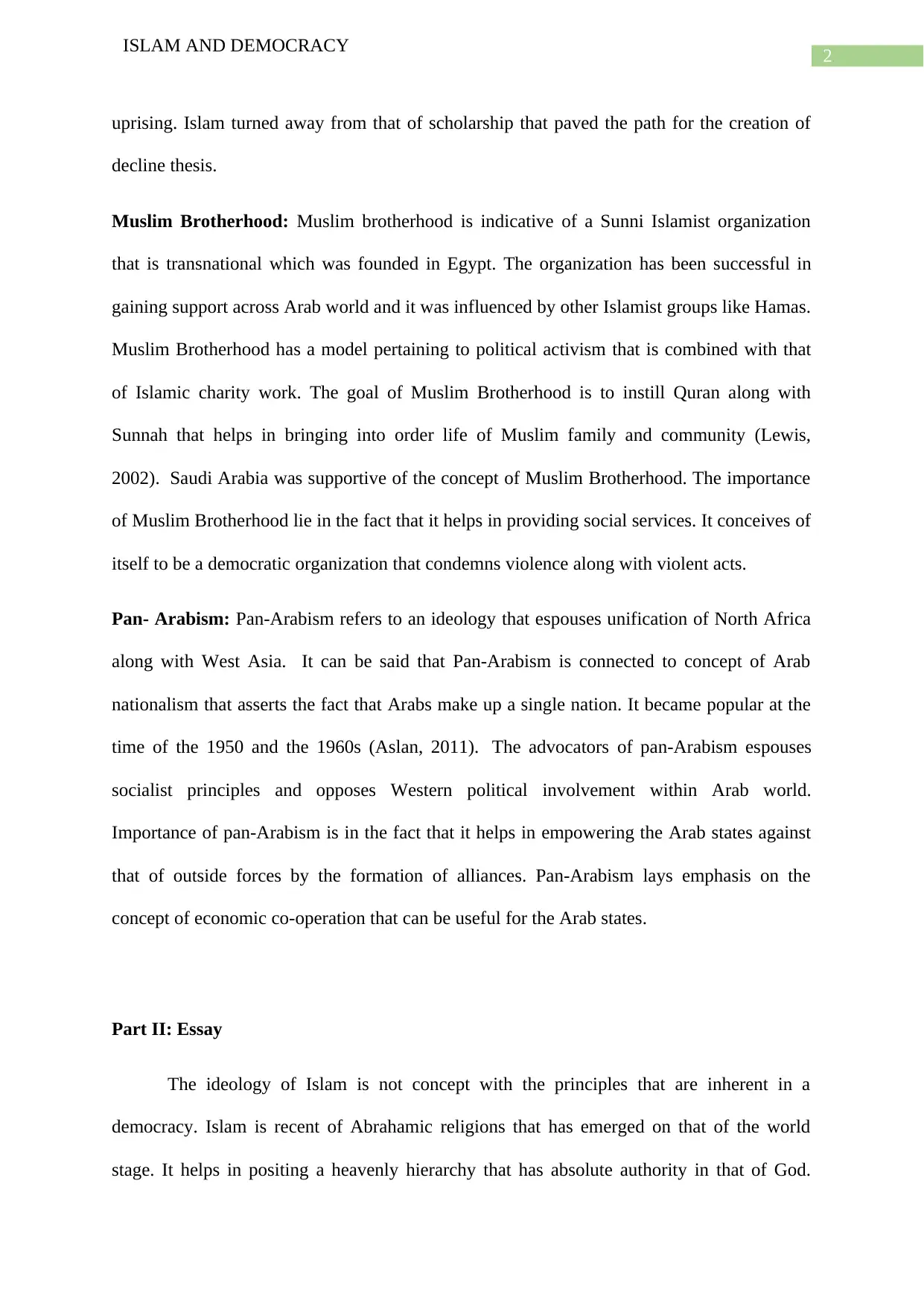
2
ISLAM AND DEMOCRACY
uprising. Islam turned away from that of scholarship that paved the path for the creation of
decline thesis.
Muslim Brotherhood: Muslim brotherhood is indicative of a Sunni Islamist organization
that is transnational which was founded in Egypt. The organization has been successful in
gaining support across Arab world and it was influenced by other Islamist groups like Hamas.
Muslim Brotherhood has a model pertaining to political activism that is combined with that
of Islamic charity work. The goal of Muslim Brotherhood is to instill Quran along with
Sunnah that helps in bringing into order life of Muslim family and community (Lewis,
2002). Saudi Arabia was supportive of the concept of Muslim Brotherhood. The importance
of Muslim Brotherhood lie in the fact that it helps in providing social services. It conceives of
itself to be a democratic organization that condemns violence along with violent acts.
Pan- Arabism: Pan-Arabism refers to an ideology that espouses unification of North Africa
along with West Asia. It can be said that Pan-Arabism is connected to concept of Arab
nationalism that asserts the fact that Arabs make up a single nation. It became popular at the
time of the 1950 and the 1960s (Aslan, 2011). The advocators of pan-Arabism espouses
socialist principles and opposes Western political involvement within Arab world.
Importance of pan-Arabism is in the fact that it helps in empowering the Arab states against
that of outside forces by the formation of alliances. Pan-Arabism lays emphasis on the
concept of economic co-operation that can be useful for the Arab states.
Part II: Essay
The ideology of Islam is not concept with the principles that are inherent in a
democracy. Islam is recent of Abrahamic religions that has emerged on that of the world
stage. It helps in positing a heavenly hierarchy that has absolute authority in that of God.
ISLAM AND DEMOCRACY
uprising. Islam turned away from that of scholarship that paved the path for the creation of
decline thesis.
Muslim Brotherhood: Muslim brotherhood is indicative of a Sunni Islamist organization
that is transnational which was founded in Egypt. The organization has been successful in
gaining support across Arab world and it was influenced by other Islamist groups like Hamas.
Muslim Brotherhood has a model pertaining to political activism that is combined with that
of Islamic charity work. The goal of Muslim Brotherhood is to instill Quran along with
Sunnah that helps in bringing into order life of Muslim family and community (Lewis,
2002). Saudi Arabia was supportive of the concept of Muslim Brotherhood. The importance
of Muslim Brotherhood lie in the fact that it helps in providing social services. It conceives of
itself to be a democratic organization that condemns violence along with violent acts.
Pan- Arabism: Pan-Arabism refers to an ideology that espouses unification of North Africa
along with West Asia. It can be said that Pan-Arabism is connected to concept of Arab
nationalism that asserts the fact that Arabs make up a single nation. It became popular at the
time of the 1950 and the 1960s (Aslan, 2011). The advocators of pan-Arabism espouses
socialist principles and opposes Western political involvement within Arab world.
Importance of pan-Arabism is in the fact that it helps in empowering the Arab states against
that of outside forces by the formation of alliances. Pan-Arabism lays emphasis on the
concept of economic co-operation that can be useful for the Arab states.
Part II: Essay
The ideology of Islam is not concept with the principles that are inherent in a
democracy. Islam is recent of Abrahamic religions that has emerged on that of the world
stage. It helps in positing a heavenly hierarchy that has absolute authority in that of God.
⊘ This is a preview!⊘
Do you want full access?
Subscribe today to unlock all pages.

Trusted by 1+ million students worldwide
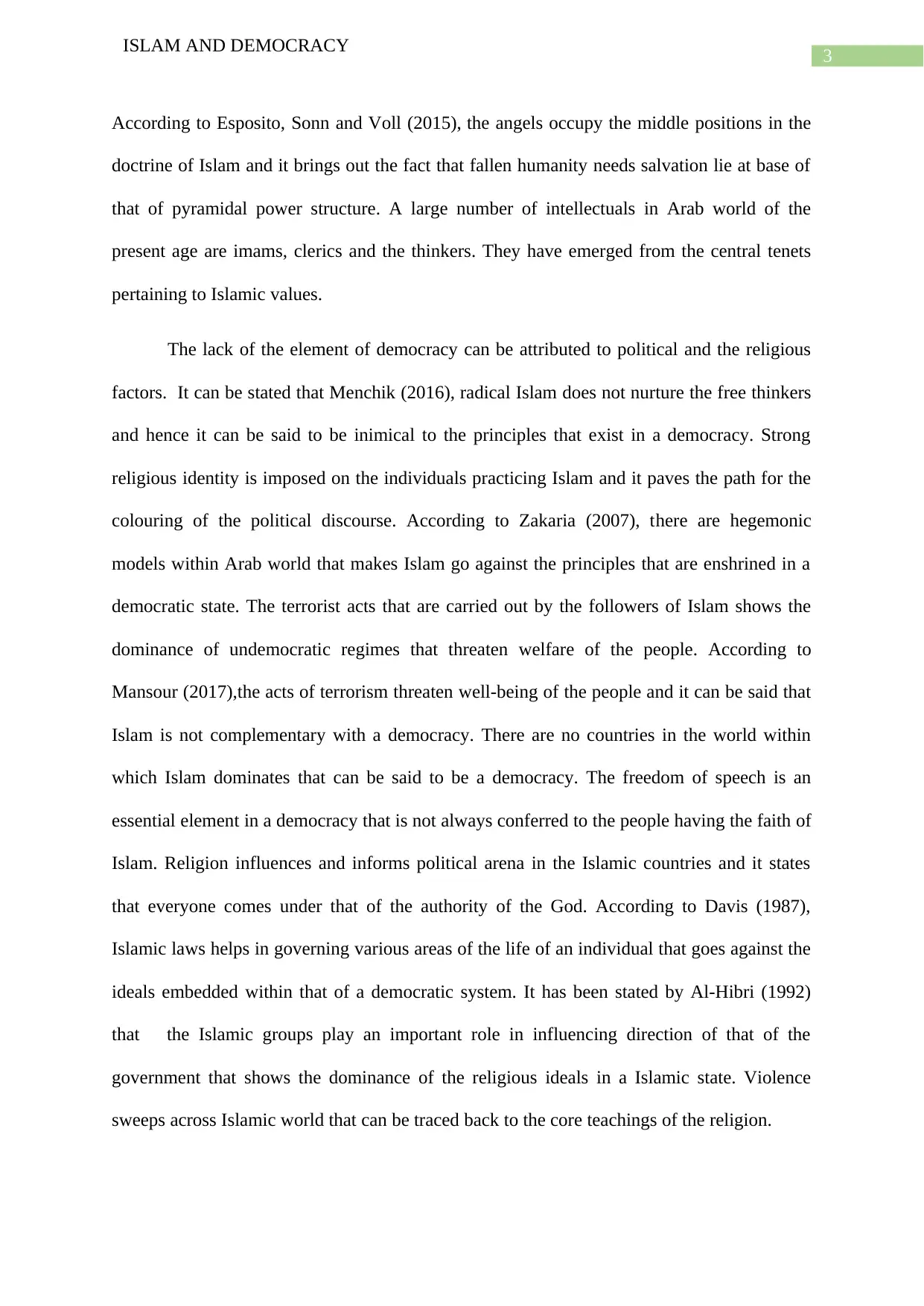
3
ISLAM AND DEMOCRACY
According to Esposito, Sonn and Voll (2015), the angels occupy the middle positions in the
doctrine of Islam and it brings out the fact that fallen humanity needs salvation lie at base of
that of pyramidal power structure. A large number of intellectuals in Arab world of the
present age are imams, clerics and the thinkers. They have emerged from the central tenets
pertaining to Islamic values.
The lack of the element of democracy can be attributed to political and the religious
factors. It can be stated that Menchik (2016), radical Islam does not nurture the free thinkers
and hence it can be said to be inimical to the principles that exist in a democracy. Strong
religious identity is imposed on the individuals practicing Islam and it paves the path for the
colouring of the political discourse. According to Zakaria (2007), there are hegemonic
models within Arab world that makes Islam go against the principles that are enshrined in a
democratic state. The terrorist acts that are carried out by the followers of Islam shows the
dominance of undemocratic regimes that threaten welfare of the people. According to
Mansour (2017),the acts of terrorism threaten well-being of the people and it can be said that
Islam is not complementary with a democracy. There are no countries in the world within
which Islam dominates that can be said to be a democracy. The freedom of speech is an
essential element in a democracy that is not always conferred to the people having the faith of
Islam. Religion influences and informs political arena in the Islamic countries and it states
that everyone comes under that of the authority of the God. According to Davis (1987),
Islamic laws helps in governing various areas of the life of an individual that goes against the
ideals embedded within that of a democratic system. It has been stated by Al-Hibri (1992)
that the Islamic groups play an important role in influencing direction of that of the
government that shows the dominance of the religious ideals in a Islamic state. Violence
sweeps across Islamic world that can be traced back to the core teachings of the religion.
ISLAM AND DEMOCRACY
According to Esposito, Sonn and Voll (2015), the angels occupy the middle positions in the
doctrine of Islam and it brings out the fact that fallen humanity needs salvation lie at base of
that of pyramidal power structure. A large number of intellectuals in Arab world of the
present age are imams, clerics and the thinkers. They have emerged from the central tenets
pertaining to Islamic values.
The lack of the element of democracy can be attributed to political and the religious
factors. It can be stated that Menchik (2016), radical Islam does not nurture the free thinkers
and hence it can be said to be inimical to the principles that exist in a democracy. Strong
religious identity is imposed on the individuals practicing Islam and it paves the path for the
colouring of the political discourse. According to Zakaria (2007), there are hegemonic
models within Arab world that makes Islam go against the principles that are enshrined in a
democratic state. The terrorist acts that are carried out by the followers of Islam shows the
dominance of undemocratic regimes that threaten welfare of the people. According to
Mansour (2017),the acts of terrorism threaten well-being of the people and it can be said that
Islam is not complementary with a democracy. There are no countries in the world within
which Islam dominates that can be said to be a democracy. The freedom of speech is an
essential element in a democracy that is not always conferred to the people having the faith of
Islam. Religion influences and informs political arena in the Islamic countries and it states
that everyone comes under that of the authority of the God. According to Davis (1987),
Islamic laws helps in governing various areas of the life of an individual that goes against the
ideals embedded within that of a democratic system. It has been stated by Al-Hibri (1992)
that the Islamic groups play an important role in influencing direction of that of the
government that shows the dominance of the religious ideals in a Islamic state. Violence
sweeps across Islamic world that can be traced back to the core teachings of the religion.
Paraphrase This Document
Need a fresh take? Get an instant paraphrase of this document with our AI Paraphraser
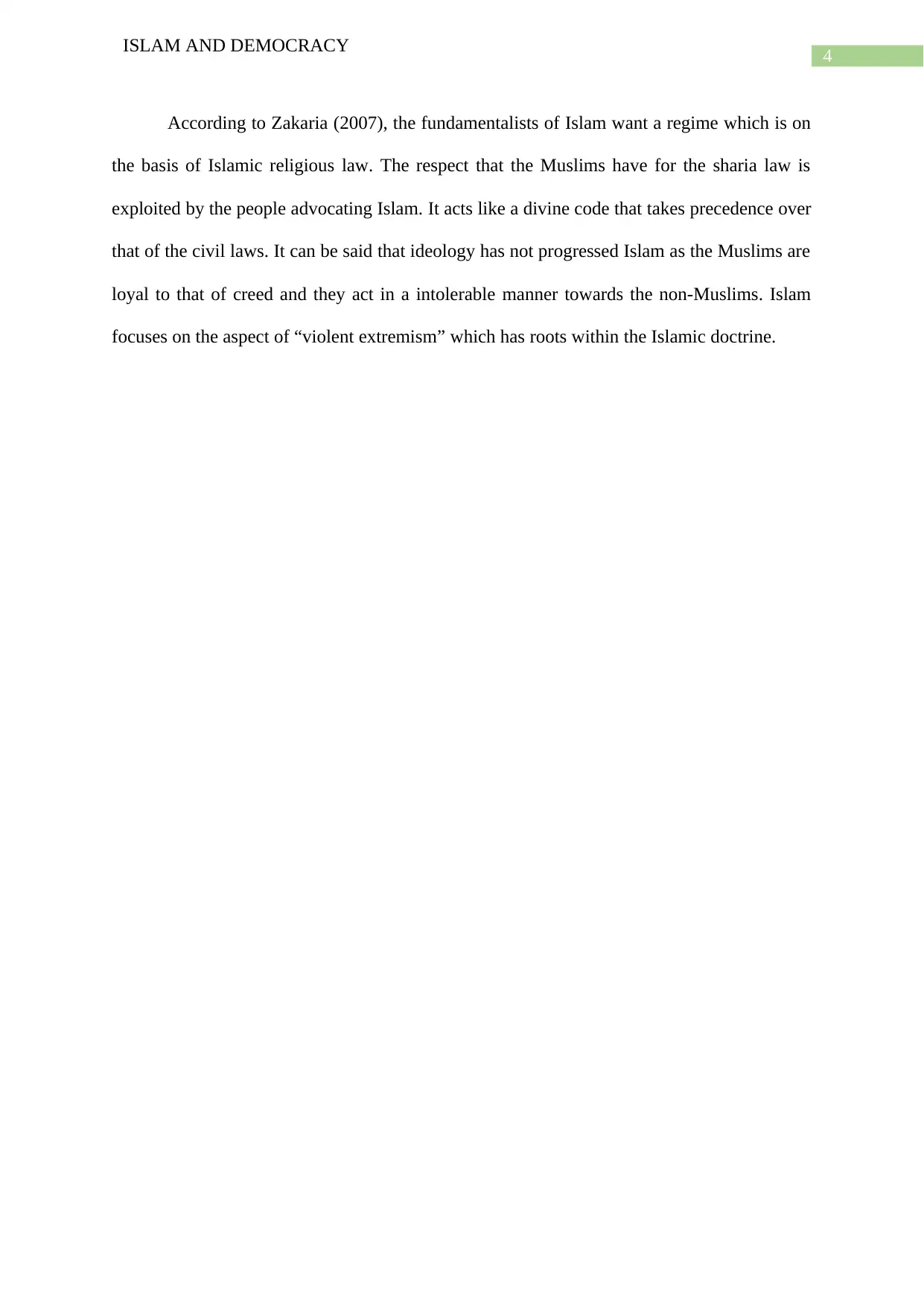
4
ISLAM AND DEMOCRACY
According to Zakaria (2007), the fundamentalists of Islam want a regime which is on
the basis of Islamic religious law. The respect that the Muslims have for the sharia law is
exploited by the people advocating Islam. It acts like a divine code that takes precedence over
that of the civil laws. It can be said that ideology has not progressed Islam as the Muslims are
loyal to that of creed and they act in a intolerable manner towards the non-Muslims. Islam
focuses on the aspect of “violent extremism” which has roots within the Islamic doctrine.
ISLAM AND DEMOCRACY
According to Zakaria (2007), the fundamentalists of Islam want a regime which is on
the basis of Islamic religious law. The respect that the Muslims have for the sharia law is
exploited by the people advocating Islam. It acts like a divine code that takes precedence over
that of the civil laws. It can be said that ideology has not progressed Islam as the Muslims are
loyal to that of creed and they act in a intolerable manner towards the non-Muslims. Islam
focuses on the aspect of “violent extremism” which has roots within the Islamic doctrine.
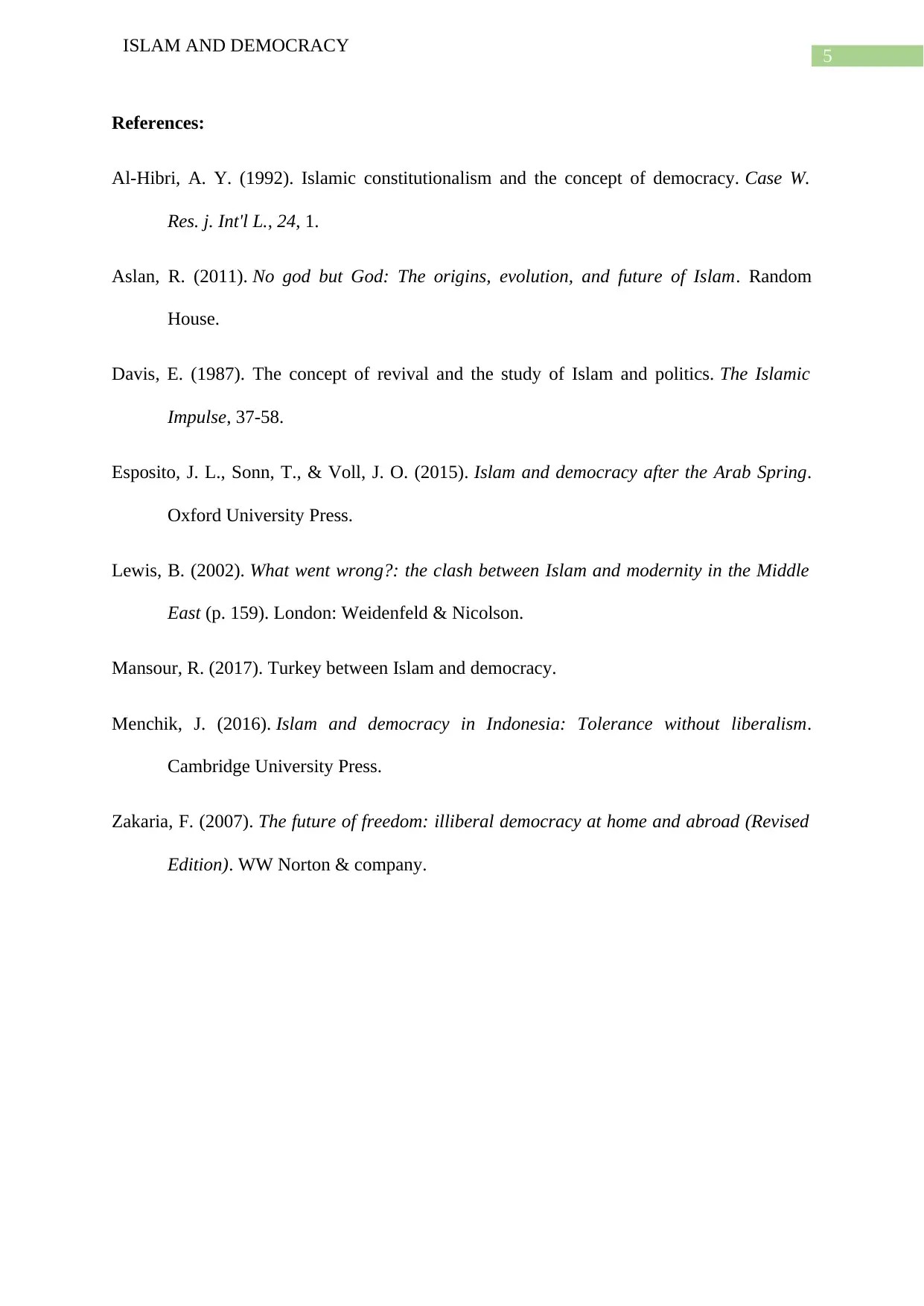
5
ISLAM AND DEMOCRACY
References:
Al-Hibri, A. Y. (1992). Islamic constitutionalism and the concept of democracy. Case W.
Res. j. Int'l L., 24, 1.
Aslan, R. (2011). No god but God: The origins, evolution, and future of Islam. Random
House.
Davis, E. (1987). The concept of revival and the study of Islam and politics. The Islamic
Impulse, 37-58.
Esposito, J. L., Sonn, T., & Voll, J. O. (2015). Islam and democracy after the Arab Spring.
Oxford University Press.
Lewis, B. (2002). What went wrong?: the clash between Islam and modernity in the Middle
East (p. 159). London: Weidenfeld & Nicolson.
Mansour, R. (2017). Turkey between Islam and democracy.
Menchik, J. (2016). Islam and democracy in Indonesia: Tolerance without liberalism.
Cambridge University Press.
Zakaria, F. (2007). The future of freedom: illiberal democracy at home and abroad (Revised
Edition). WW Norton & company.
ISLAM AND DEMOCRACY
References:
Al-Hibri, A. Y. (1992). Islamic constitutionalism and the concept of democracy. Case W.
Res. j. Int'l L., 24, 1.
Aslan, R. (2011). No god but God: The origins, evolution, and future of Islam. Random
House.
Davis, E. (1987). The concept of revival and the study of Islam and politics. The Islamic
Impulse, 37-58.
Esposito, J. L., Sonn, T., & Voll, J. O. (2015). Islam and democracy after the Arab Spring.
Oxford University Press.
Lewis, B. (2002). What went wrong?: the clash between Islam and modernity in the Middle
East (p. 159). London: Weidenfeld & Nicolson.
Mansour, R. (2017). Turkey between Islam and democracy.
Menchik, J. (2016). Islam and democracy in Indonesia: Tolerance without liberalism.
Cambridge University Press.
Zakaria, F. (2007). The future of freedom: illiberal democracy at home and abroad (Revised
Edition). WW Norton & company.
⊘ This is a preview!⊘
Do you want full access?
Subscribe today to unlock all pages.

Trusted by 1+ million students worldwide
1 out of 6
Your All-in-One AI-Powered Toolkit for Academic Success.
+13062052269
info@desklib.com
Available 24*7 on WhatsApp / Email
![[object Object]](/_next/static/media/star-bottom.7253800d.svg)
Unlock your academic potential
Copyright © 2020–2025 A2Z Services. All Rights Reserved. Developed and managed by ZUCOL.